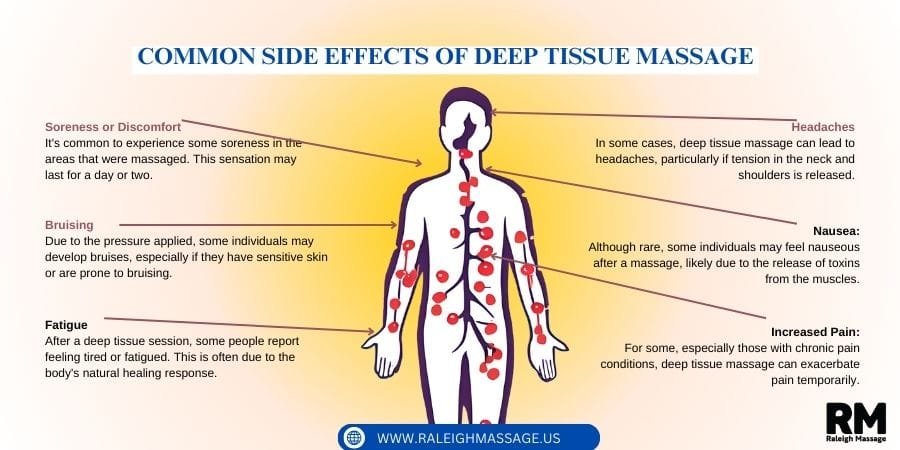So a few questions? have you ever gotten a deep tissue massage? If so, you may have experienced some of the common side effects that can occur afterward. These can include soreness, tenderness, or even mild bruising in the areas that were worked on, as the massage targets deeper layers of muscle and fascia. I know how easy it is, in particular when you’re suffering from stiff muscles or chronic pain. Deep tissue massage is widely known as the best therapeutic treatment for releasing tension and promoting healing. But it’s not all sunshine and rainbows; some potential side effects of a deep tissue massage you’ll want to consider before scheduling your next appointment.
I’m not trying to scare you from massages, but I think it’s good to go in prepared. That way you can enjoy the benefits without the surprises.
Can Deep Tissue Massage Make You Feel Worse Before You Feel Better?
Sometimes, deep tissue massage feels a bit like taking two steps forward and one step back. It can leave you feeling sore, tired, or even uncomfortable in the short term. But for many people, these initial side effects are worth the long-term benefits.
I’ve found that listening to your body is key. If the pain or discomfort lasts longer than a few days, there could be something else going on that needs attention. Always consult a doctor if you’re unsure.
Tips to Minimize Side Effects of a Deep Tissue Massage
If you’re like me, you don’t want your massage to be more painful than soothing. “The good news is: There are ways to decrease the chances of side effects of a deep tissue massage occurring.”
- Talk to Your Therapist
Keep it real about your pain tolerance level, areas of concern, and previous injuries. A good therapist will modify the pressure level to what you can tolerate.
- Stay Hydrated
Massages release toxins, and drinking water helps flush them out. This can help ease soreness and avoid headaches.
- Stretch or Move Gently
Light stretching (or gentle yoga) will help keep your muscles flexible and minimize any stiffness from the massage.
- Apply Heat or Ice
Using a warm compress can help soothe sore areas, while an ice pack can alleviate any swelling or bruising.
- Take Rest Seriously
Give your body time to recover from the massage. A little self-care goes a long way.
When to Avoid Deep Tissue Massage
For some, deep tissue massage isn’t the best option. If you have conditions like osteoporosis, open wounds, or severe heart issues, it’s safer to avoid this type of therapy. Also, if you’re pregnant, always check with your doctor first. There are specific types of massage that are safer for expecting mothers.
Sometimes, what your body needs is a gentler approach. Listen to how you feel and don’t ignore red flags.
Is Deep Tissue Massage Worth It?
Despite the side effects of a deep tissue massage, I believe deep tissue massage can be very much helpful for many individuals. It can relieve chronic pain and stiffness and even encourage better posture. But like anything else, it’s not a one-size-fits-all solution.
Like you, I’ve used it when savoring back pain, but I’ve also gained wisdom from making my body my own—if something isn’t fun, you walk away. Everyone is unique, and what works for me may not work for you.
Deep tissue massage can be a rollercoaster ride of sensations. From one in general soreness to possible bruises, it isn’t always smooth sailing. But with careful, even preparation, the trade-offs are usually worth it. Just ensure to talk to your therapist and keep having self-care.
FAQs for Side Effects of a Deep Tissue Massage
Does deep tissue massage release toxins in the body?
Yes, deep tissue massage can release toxins from your muscles into your bloodstream. That’s why it’s important to hydrate well after a session. Drinking water helps your body in getting rid of toxins better and helps reduce soreness.
How long can soreness last after a deep tissue massage?
Most soreness occurs within 24 to 48 hours, like the “good sore” feeling after a workout. You can handle it with fluids, rest, and heat or ice pads. If the soreness continues for longer, then it would be worth following up with your therapist.”
Should people with injuries receive a deep tissue massage?
It depends on the injury. A light massage may be OK, while deep tissue massage may worsen problems like fractures or torn muscles. Always check with your physician if you have any concerns prior to booking a session.
How many times should you go for a deep tissue massage?
This will depend on your goals and how your body responds. Others only require one every month, while some benefit from a weekly session. Your needs will be unique; talk to a therapist for tailored guidance.
Who would it be helpful for? Who should avoid?
No, it’s not right for everyone. If you suffer from diabetes, bleeding disorders, or are pregnant, you should consult your doctor before trying. In your case, you might be better suited to some other, gentler massage.








